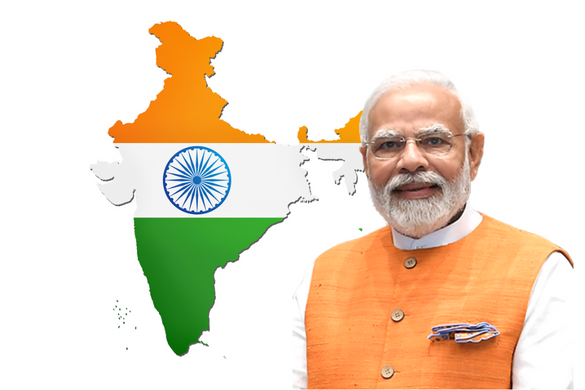Leadership Lessons We Should Learn From Narendra Modi’s Governance of Gujarat

What Narendra Modi will be able to do for India, as Prime Minister, remains to be seen. As we pen this article, we are awaiting the recently elected BJP-led Government’s impending Budget delivery. But, what the man who has famously stated “There’s no alternative to good governance”, has been able to do for the state of Gujarat, as its Chief Minister (7 October, 2001 to 22 May, 2014) is plain for all to see, so the future for the country seems bright.
In his term at the helm of affairs, Narendra Modi was able to transform the state into a magnet for private sector investment. So, how did now PM Narendra Modi manage to mobilize both the administrative machinery of his home-state and its populace, and motivate them to work together to achieve results that are so tangible that the world is offering its applause? GA decided to take a look at his leadership skills and methodologies, and see how we in the gems and jewellery trade might be able to apply them towards our betterment. Here are some of our suggestions for leadership qualities we would all do well to inculcate – inspired by our country’s present Prime Minister, Narendra Modi’s governance of Gujarat.
1) Go to the grass-root level, talk to people: If people at the rudder of leadership or management are oblivious to ground-realities, they will not be able to connect with their people, and certainly not be able to bring about changes the system may be calling out for. Prime Minister Narendra Modi is known for talking to people directly concerned with any issue and truly understanding the problem from their perspective. As a leader, one needs to be connected with one’s people – be it employees, customers or other stakeholders.
2) Find out what people’s strengths are, delegate and empower them: As Chief Minister of Gujarat, PM Modi was known for harvesting both natural and human resources. “I motivate civil servants to take decisions – I encourage them to take up projects which give them self-satisfaction”, said Modi at a global meet held in Washington, which he addressed via satellite.
No one can be a master of all trades, so one must learn to delegate to others.Everyone has some strength – something they excel at, or are passionate about. As leaders, we should find out what best strengths our individual team-members can bring to the fold. We should impart responsibilities in keeping with key strengths. We should empower people to make on-the-spot decisions. If they have a thorough knowledge about a particular area, their decisions are likely to yield desirable results. Long chains-of-command generally have us losing valuable time and often, business leads. Decentralisation of power makes processes run quicker.
3) Inculcate a sense of accountability: Decentralisation of power must be accompanied by accountability. Each member of a team must be held individually accountable for his / her actions, and the team must be held accountable as a whole, too. It’s always a good idea to have systems of checks and balances in place, so no one person is in a position of power enough to act against the interest of the company or its stakeholders. PM Modi is proclaimed to be a firm believer in reducing the possibility of misuse to the minimum, with reference to a democratic set-up.
4) Enhance the level of transparency, exchange of information and participation: In PM Modi’s own words, “The time for secrecy is gone”. As Chief Minister of Gujarat, and now as Prime Minister, he is known for e-governance and exchanging information with citizens on a real-time basis. He has often in speeches, advocated the need for moving from representative democracy to participatory democracy. During his time as Chief Minister of Gujarat, it was not uncommon for him to put up drafts of policies online, for feedback from the people. So policies were, in effect, owned not just by the government, but by the people as well. Under his government, the PMO is active on social media and on its own official website, with regular blog posts being issued about current happenings. This sort of information exchange should ideally be followed by any institution. It would lead to more effective policies, higher morale and trust and loyalty among employees.
5) Turn adversity into opportunity: PM Modi is known to be able to turn adversity into opportunity. As just a couple of examples: The state of Gujarat does not have diamond mines, but 80 percent of diamonds are processed there; The state does not have iron ore or steel but Gujarat is fast becoming an auto hub. Working on weaknesses always opens up numerous opportunities.
6) Prioritise, but do not neglect the “important” for the sake of the “urgent”: No one would argue against the fact that prioritising is a good thing. However, as Narendra Modi has pointed out, most of us spend all of our time on “the urgent”, and in doing so, a lot of “the important” remains undone. Governments and corporate management alike, and even on an individual level, we keep dealing with day-to-day situations, and important issues get left in the proverbial back-burner. It’s these same issues that then grow into tomorrow’s crises, so, as advocated by PM Narendra Modi, we must remember to set some time aside everyday for handling issues that may not be as urgent as the ones that are on the top of our list of priorities, but are important nonetheless. It is said by some of Narendra Modi’s close aides that he has a list of things to do for the day, which he tackles from bottom-to-top – Like him, we should all have a list of things to do for the day, and for a long-term duration. Adequate attention should be paid to every point on the list.
7) Think beyond the obvious, when faced with a problem: At the same global meet in Washington, in which he made an address via satellite, when he was still Chief Minister of Gujarat, Narendra Modi cited an example of farmers demanding high electrical subsidy for drawing underground water. When he spoke in detail to the farmers, he realised that what they really needed was “not electricity, but water”, and looked for an answer in providing them with enough surface water, while appealing to them for water conservation through micro-irrigation, etc. The state government and the people worked together to create water harvesting and conservation structures. The results were tremendous and far-reaching. Very often, a little lateral thinking gives us answers to a lot of problems. If you are facing any issue, talk to your staff, customers, etc, and brainstorm together for all possible solutions.
8) Study best practices: They say that one should learn from one’s mistakes. But, truly wise people learn from other people’s mistakes as well. Studying best practices in any area helps ameliorate the time lost in trial and error. Constant research of best practices of competitors and allies is a must.
9) Invest in technology and knowledge development: If there’s one thing all can note in dissecting Gujarat’s growth model, it’s that the state invested deeply in technology and knowledge development. From its optical fibre network, which is the biggest in Asia, and its development of roads, to its Forensic Science University, which is the only dedicated Forensic Science institute in the world and its Petroleum and Law university, etc, Narendra Modi left no stone unturned to see that high investments were made towards technology and knowledge development. The gems and jewellery sector in particular, exhibits a hesitance for investing in R&D and knowledge growth. Let us take a cue from PM Narendra Modi here too – developing a knowledge and technology driven society can only benefit us in the long-run. Only if you make conditions conducive for others to do business with you, will you be able to thrive in the present and enjoy sustainability for the future.
10) Follow principles of good governance: If there was no mutual trust, the people of Gujarat would not have elected and re-elected Narendra Modi’s government into power. Narendra Modi has been a deep advocate of honesty of purpose and integrity of intentions. If we can follow this advocacy, our endeavours are bound to thrust us forward with skill and scale. “Good governance”, according to Narendra Modi, “is always easy and effective governance”. He has always advocated the need for a good framework within which the best possible governance can see fruition.
11) Think “big”: Narendra Modi would not have got where he is today, or taken the state which was his home to its current level of progress, if he didn’t think “big”. Rarely has one ever achieved anything without thinking and dreaming about it first.
12) Introspect, analyse results and keep evolving: Evolution is an ongoing process. Nothing stops evolving. Times change and policies and how we tackle issues must change with circumstance. Narendra Modi has shown through his governance in Gujarat that policies need constant tweaking. We must never cease to analyse how our rules, policies and procedures are working for our management, employees, customers, etc, in the current environment. We must keep looking at results of marketing efforts, etc, and keep evolving.
No one can really argue against the fact that Narendra Modi imbibes effective leadership qualities – perhaps more than could be enunciated in this article. But, the tips enumerated above are universal laws for great leadership, and we are all likely to reap rich dividends if we follow them. Here’s to successful leadership!
If you have any tips on how we can improve our leadership skills, we’d love to hear them at: info@gematlas.com.

